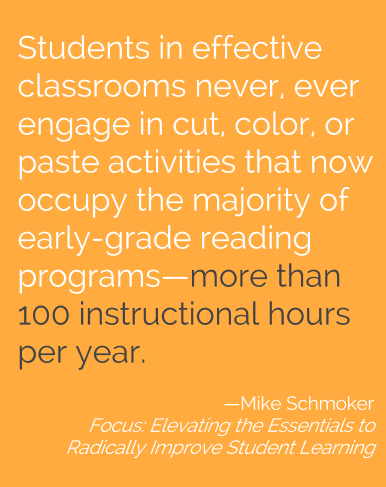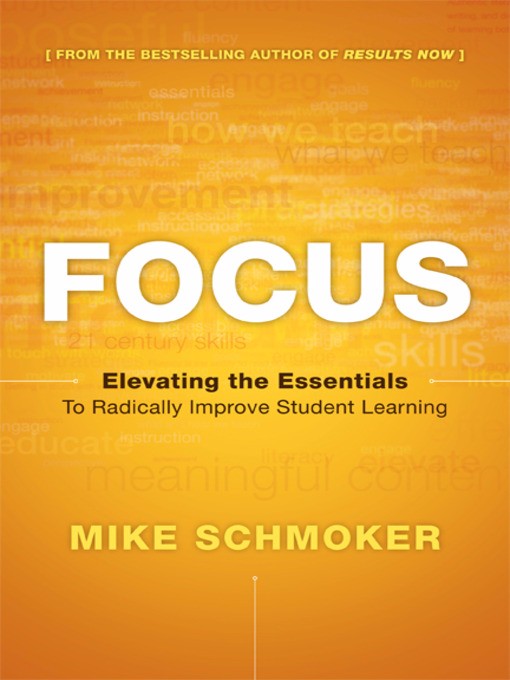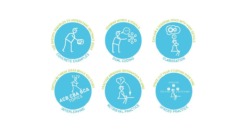This page contains Bookshop.org links. When you make a purchase through these links, Cult of Pedagogy gets a small percentage of the sale at no extra cost to you. What’s the difference between Amazon and Bookshop.org?
If you’ve been on Instagram, Facebook, or Pinterest lately, you may have noticed a new spotlight on simplicity and tradition. Whether it be whittling your wardrobe down to 27 pieces, making homemade baby food, or recycling pallets as wall decor, it seems our society is determined to return to the good ol’ days. People are actively rejecting the over-processed abundance of the past few decades in favor of a more humble and simple life.
However, if you are an educator, you may observe the discrepancy between the trends in the outside world versus what is happening in schools. Get on those same social media sites and try not to drown in the deluge of ever-changing education trends. Changes in technology, STEM, STEAM, PBL, and trends in specific content areas make it hard not to feel overwhelmed by the expectation to keep up with everything. At this point, simple is NOT a trending concept in education. But I think there is a place for simplicity and tradition in education, and Mike Schmoker agrees.
In his 2011 book, Focus: Elevating the Essentials to Radically Improve Student Learning, he lays out a plan that can be implemented in any school district: a concentrated focus on reading, writing, discussion and thinking across the curriculum. He writes that our highest priorities should be “the reasonably effective implementation of good curriculum, effective instruction, and authentic literacy.”
That’s pretty much it. Sounds too simple, doesn’t it?
Don’t worry, Schmoker goes into detail about these ideas, showing us that despite its apparent simplicity, a sharp focus on a few key areas can dramatically improve student learning. Citing examples of schools that have made similar changes with great success, he divides his book into three sections: what we teach, how we teach, and curriculum, instruction, and literacy in the content areas.
What We Teach
At times, I sit at my desk frowning at the English 11 CCRS standards and our district curriculum guide, wondering how on earth I will ever fit it all in. In Focus, Schmoker solves this problem: He says we need to sit down with our departments and determine what is actually important. We need to establish how much reading, writing, and speaking our students need to do and be consistent within our PLCs.
Currently, the drive is for college and career readiness, and the argument here is that we are also preparing kids to be citizens. The best way to prepare students for all three of these, Schmoker argues, is to refocus on literacy in every single class. Students need to be able to read, write, speak, and think critically in order to function as contributing members of society.
Again, this might seem too simple, but I think that’s what makes it so meaningful. As one sub-section is titled, we need to focus on “Plain old reading and writing.” While Schmoker doesn’t completely write off the importance of technology, he does point out that a lot of technology use has become a waste of time, taking away valuable academic learning time. This might rub some—especially those heavily involved in the tech movement—the wrong way, but it makes sense. These are the most essential skills that students need, and without them, it doesn’t matter if they can use technology or not. They will never become informed citizens, and that is a scary future. But technology gurus, please do not turn your nose up at this book. I, too, am a tech advocate. I believe in the importance of technology in our schools; however, I can see Schmoker’s point. Why are students making online posters about F. Scott Fitzgerald when they should be reading, writing about, and discussing his work instead? I promise you, anyone will find value in the simplicity of the message in this book.
How We Teach
In this section Schmoker provides specific ways to teach in order to effectively improve student literacy. I personally love the clarity of his guide to effective lessons. A teacher leading an effective lesson needs to:
Have clear objectives: What are kids supposed to gain from this lesson or unit?
Create purpose and interest: This doesn’t mean put on a dog and pony show. It simply means we should find a way to make the day’s lesson relevant. No one, including you and I, enjoys reading or discussing topics we are not interested in.
Provide background knowledge: Make sure students are equipped to understand what you’re about to guide them through.
Model: There are many ways this can be done, and sometimes it happens in the form of lecture or direct teaching (gasp!). Keep in mind the 5 minute limit: Every few minutes take a break and have students DO something—pair and share, write what they know, ask questions, etc.
Guide student practice: Lecture and direct teaching are not inherently bad, but they will not be successful without this particular step. Students absolutely MUST practice with the help or guidance of the teacher or fellow classmates.
Allow time for independent practice and formative assessment: Create activities that allow students to show what they know from the lesson. Schmoker gives examples of these such as discussion and debate, and writing, both formal and informal.
Once again, seems extremely simple, right? Thankfully, it’s also effective and doable in every subject. The best part, as Schmoker says, is that “perfect execution of these processes is not required. The real power of this simple, multipurpose template is in its being done regularly and frequently.”
Curriculum, Instruction, and Literacy in the Content Areas
Schmoker says the standards for each subject area need to be reduced, with a renewed focus on literacy in every content area:
English Language Arts
- In the early years, students need time to read, not to do skills drills or reading “activities.” Schmoker points out that in the most effective reading classrooms, students “never, ever engage in cut, color, or paste activities that now occupy the majority of early-grade reading programs—more than 100 instructional hours per year.”
- Students should be exposed to broad, wide reading of both fiction and nonfiction: “We learn to read well by reading a lot for meaning: to analyze or support arguments, to arrive at our own opinions as we make inferences or attempt to solve problems.”
- Handle the paper load: Don’t collect or grade everything; focus feedback on specific issues rather than everything in a piece of writing.
- Students should be involved in discussions at least three times per week, with established criteria to guide them; write at least one formal essay per month (or a minimum number agreed up on by PLCs); and give one or two presentations per semester based on their formal writing.

Social Studies
- Reading and writing must be at the core: Too many teachers are falling for “faddish” activities like skits and posters.
- Build the bulk of instruction on some textbook reading with a lot of supplemental and primary source reading, along with articles on current events.
- Follow the task, text, talk framework: focus on a couple of guiding questions, read to inquire about these topics, respond in writing using evidence from texts to support ideas, and discuss or share regularly.
Science
- Again, utilize the task, text, talk framework.
- Students must be taught how to read a science textbook (I wish I had been taught this in high school!): They will read complex texts in college and the real world, so they must learn how to successfully wrestle with this type of text.
- Teachers need to focus more on literacy and less on labs, learning through close reading of the textbook and supplemental texts to gain a deep understanding of the content before diving into content-focused labs.
Math
- Reduce the overall number of standards and teach them with more depth and meaning.
- Move instructional focus away from abstract, algebra-based math—which people don’t often use in the real world—toward using simple math (addition, subtraction, multiplication, and division) to address complex situations and problems.
- Use data, articles, charts, and other visual representations to interpret and use math, which could lead to opportunities for discussion and writing.
How Schmoker Has Helped Me Focus
Sometimes it can be hard to stay focused (pun intended) as a teacher. With the new year in full swing we are reading blogs, PD books, and tweets, we’re attending conferences, and we’re meeting with colleagues to plan upcoming units. It’s a lot to keep track of. But this year I’m trying to filter the influx of ideas through the lens of Mike Schmoker:
- Schmoker says to focus on authentic literacy, so in my class we are writing more often, and more than just essays. Already this semester, my students have completed multiple quick writes, paragraphs, and two full essays. In addition, we have talked about and looked at examples of “real world” writing. Next week we will begin an expression piece modeled after an article we will read together, and at the beginning of next semester, we will write college admissions and scholarship essays.
- Schmoker says to model what we are asking our students to do. This is hard, but I have already forced myself to do this more times than ever before. For every formal writing assignment so far, I have provided them with an example. It’s hard enough to put myself out there on a blog, but at least I can’t see the faces of my readers. In class it’s very different because as I write there are 25 sets of eyes watching, judging. But already I think it has been useful. My students see that my writing is not perfect. They see that I have to wrestle with my writing just like they do. And they understand that throughout the year, we will work through our struggles together.
- I have narrowed down the list of 34 (yes, 34! plus sub-standards) CCRS standards that I am expected to address with my Juniors. Many of them can be grouped together and simplified, which has helped me to concentrate my planning on what they really need: reading, writing, speaking, thinking. My students read more than just class novels, and short stories chosen by me. Instead, we will study articles, contemporary poetry, independent reading, TED Talks and even manuals (I have a ceiling fan manual in my school bag right now).
- We’re taking writing to a whole new level. Rather than our daily warm-ups and the handful of essays we usually attempt throughout the year, instead we are writing almost every day. We use our reading as mentor texts to guide our daily writing. In the first two days of school my kids read a poem, wrote both days, and discussed in small groups and as a whole class. The bar was set in those first two days, and has been raised (or at least not lowered) every day since. I showed them how class was going to run and I explained that our goal is to increase the volume of their reading, writing and speaking so they can see improvements this year. They come into class every day knowing they will be working on at least one, if not all three, of those skills, and not a day has gone by this year that we haven’t. I’m excited by the way using Schmoker’s approach to teaching has already changed my classroom and helped my students grow this year, and I can’t wait to see where we all are at the end of the school year.
So, as you make your own decisions about what to teach and how to teach it, keep simplicity in mind. Despite being inundated by emails, posts, and pictures that make our job seem more complicated, use Schmoker’s guidance to refocus on what’s most important for our students: reading, writing, speaking, and thinking across the board. ♦
Join my mailing list and get weekly tips, tools, and inspiration — in quick, bite-sized packages — all geared toward making your teaching more effective and fun. To thank you, I’ll send you a free copy of my new e-booklet, 20 Ways to Cut Your Grading Time in Half. I look forward to getting to know you better!






Kristy,
This is timely, as I’m feeling that overwhelm that comes as the beginning-of-the-year feelings vanish and the undertaking of helping all kids improve sets in.
It is so easy to get caught up in “activities,” yet your list of How Schmoker Helps You Focus shows that class can still be engaging and fresh without abandoning the basics.
With my freshmen, I’ve used a daily read aloud as a way to ensure we hit those basics of reading, writing, speaking and thinking every day. Sometimes it’s a poem, sometimes it’s a passage from a book. That quick opening activity sets the tone for the class, just as you mentioned with your first two days of school.
What’s been the biggest challenge for you as you try to implement this theme of simplicity into your teaching?
Thanks for the response, Gerard. I think the biggest challenge comes from the school culture. There is a big push for using technology at my school, and sometimes I feel a little guilty that I am not. I just have to trust that I know (usually) what is best for my students and go with my gut. So far it seems to be working pretty well. I definitely think my biggest success is setting a tone for reading, writing, and speaking in my class. My kids are surprised if we don’t do those things, rather than the other way around.
Kristy
I wish this was as simple as it sounds. I wholly agree, we need to narrow down and refocus on basics. However, if I narrow down then I cannot meet all of the Standards set by the state (I am in Virginia) and my students will fail the end of course test. (I teach math). It’s so easy for teachers to say, ‘students really don’t need this content’ but not so easy to eliminate it. I wish we had more control over the curriculum and Standards the state demands.
Hey Julie! I completely agree. I do think that individual teachers who read this book are likely to be frustrated, because their hands are tied when it comes to WHAT we teach. Best case scenario? Small groups of teachers read this, buy into the concept, get their admins to let them try the principles in small doses (like as a single unit AFTER testing is done?) to see how it goes, and maybe the philosophy can ultimately make its way up to where decision-makers can learn about and embrace it. Especially with the recommendations for math, I believe adopting them would have to come from the administrator level.
However, I do think it’s possible to apply Schmoker’s thinking on a micro level: Think about some of your lowest-level students. If you’re pretty sure they are not gong to master all of the standards you are required to teach them in a given time period, is it better to just press forward with teaching as many as possible, regardless of whether they are all sinking in? Or is it possible to narrow the standards for some students, but teach them with more depth, so real mastery actually occurs for those students. I’m thinking this approach might result in these students progressing faster in upcoming years, even if they didn’t “get” all of the standards, simply because the ones they were taught were explored so deeply.
Just thinking out loud here…my teaching background is not in math, but there does seem to be a movement in the Math Ed community toward an approach more like Schmoker’s. Have you seen Jo Boaler’s YouCubed site? If not, it’s worth a look.
Good morning! I am a new Superintendent in Ohio who has recently read this book by Schmoker and been captivated by it. I truly believe that our district has fallen prey to the “initiative” inundation of education over the last 10-15 years and seen our students achievement suffer because of it. It is clear in most grade levels that we do not have a clear FOCUS. I’m very interested in hearing how this has gone for you over the last year or so, have you continued to follow Schmoker’s ideas, what success have you seen for students? Has your admin team bought in? What suggestions would you have for a district that is interested in maybe doing a focus group and book study to discuss what we can do to simplify and focus? Thank you immensely for any advice and I’d welcome speaking further in depth, if possible, via email or Twitter as I know I could learn a great deal from you. Thanks so much for any info!
Hi Jonathan,
your questions are making me reflect, that’s for sure! I am going to think through what you’ve said and see if I can formulate a solid response. If you’d like, follow me at @kmkteach on Twitter and we can keep in contact to discuss further!
It is frightening watching students struggle to read ,write , and think who are given laptops daily to log on and play games.
At the end of the day they are confused and frustrated with the disconnect that exist between the two.
This article addresses the reality that we all need a wake up call and a sense of immediate urgency before more students are lost in the struggle between increasing technology and less of teaching basic skills in reading,
writing , and thinking.
I would love to see how you grouped the standards. Would you share?
Hi Lisa, I’ll be honest, I kind of use Dave Stuart Jr to help me group the standards. If you are not familiar with him, he uses a framework that I started using to focus (http://www.davestuartjr.com/cross-content-literacy-framework/). This is kind of a cop out, but I didn’t specifically write down how I grouped my standards, I just worked with another teacher to kind of ask “Which of these standards are MOST important? Which ones needs to be taught directly, which ones will be addressed inadvertently?” This helped us focus and not get overwhelmed by the standards. Does this help? If not, please feel free to contact me directly–I would LOVE to help you work on this. 🙂 . (Email me at kristymlouden@gmail.com )
Hi Julie,
Don’t know if you still monitor this site, but wanted to thank you for your review here. I know Mike, and I passed along the link here. He was very flattered and impressed with your in-depth review. I teach in the College of Education at Grand Canyon University in Phoenix. We are constantly preaching the need to simplify. Dr. Schmoker’s articles and books have been the cornerstone for my high school English teaching career and now my position in teacher-education programs.
Thanks for sharing here!
Thank you so much! I’m glad you and Mr. Schmoker enjoyed the review. I share Focus with EVERYONE! I think the message is desperately needed in our schools.
Hi Jeff! I’m so glad to know Dr. Schmoker liked the review! Thanks so much for passing it along to him.
Second edition was ASCD book this month 8/2018. It is even better than the first.
I’m just asking if there are any math experts reading this book. It sounds a lot like direct instruction where adults teach their process for learning math content to students which goes against everything that Jo Boaler, Bill McCallum, Phil Daro, and others experts in mathematics teach. I’m all for narrowing the focus but when he says in his 2nd edition that “Effective instruction typically begins with some form of explicit teaching,” this goes against all the research in moving away from the model of I do/We do/You Do to You Try/We discuss/I help you be efficient. I realize that Schmoker’s field is in literacy but I would like to know what experts in the mathematics field think of this book.
I am left wondering where in Shmoker’s model is the room for conceptual thinking and inquiry models.
Hi Angie, I had the same thought. There are definitely some nuggets in here. Not having read the book, reading this review does make me wonder whether it’s just some really eloquent lipstick on the “back-to-basics” pig. Whether it’s “simple” ten-part version of the I Do/We Do/You Do lesson format, or ludicrous idea that “Algebra is barely used in the real world,” I’m going to have to take a pass on the math section of this theory. On the whole, I agree that the curriculum is too packed, but what should be cut is the curricular focus on calculator math and the instructional focus on information delivery.
Loved this review! We had an all staff meeting yesterday where our superintendent announced that we are going to rebuild our entire system using this book as a guide. It’s exciting! I’m curious to know how this system has worked for you and if you’re still using it in your teaching?
Thank you!
Hi Michelle, thanks for reading the review. I hope you and your colleagues enjoy Focus and much as I did! I am now an instructional coach, but even though my role has changed, I still try to keep Schmoker’s ideas at the forefront of my coaching. I also recently read Dave Stuart Jr.’s These 6 Things, which is AMAZING and definitely influenced by Focus. I’d love to hear what you think when you finish the book and I’d like to hear how the book study went!
The lesson guide is the same as Madeline Hunter Model of
1. objectives
2. Set
3. Model
4. guided practice
5. independent practice
I hope he gave credit to her and her model.
Kristy: During 30 years of teaching science, keeping it simple and encouraging reading and writing became my mantra too. While it may seem counterintuitive to focus on labs first, I found that it wasn’t until students took possession of their work by hands-on, collaborative inquiry that they fell excitedly into learning more about the subject through reading, and put pen to paper intently to explain what they saw , defending their arguments.
I am reading this in 2025 and wondering how much of these practices have persisted in your classroom. I find this book to STILL be a very practical and relevant call to action, especially for ELA teachers. Narrowing the curriculum focus to essentials in this discipline is a real need. There is so much detail in most ELA standards that finding clarity and simplification seems essential and Schmoker’s suggestions provide bold, piercing guidance through the thicket. Thanks for this post and your thoughtful explanation of its impact on your practice.
Hey Ken! Thanks for reading and sharing your thoughts. I actually left teaching about 4.5 years ago and am now doing corporate learning and development. I can say that for the 5 years after writing this, I still referred back to this book both in my classroom and when coaching new teachers. Even now, outside of the profession and while creating training for adults, I see the relevance: Cut out the noise, focus on the basics. Getting learners to read, write, think, and speak are at the core of what I’m doing 10 years later.